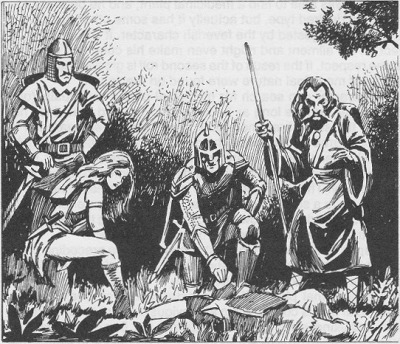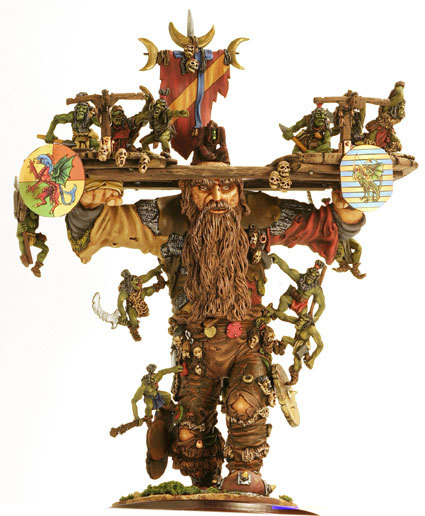This discussion about 5th edition's superhero tone has led me to meditate some more on what I don't like about 5th edition, and almost everything I don't like is something that was handed down from 4th edition, imagine that!. There are, therefore, a few house rules I plan on installing into my Sunday game:
Resting
1) Long Rests take 2+1d4 days, one roll is made for each PC; Long Rests require lots of sleep, no strenuous activity, and plenty of food and water - no more than 2 spells may be cast per day, if any; insuring a Long Rest works without interruption means staying at a monastery, hiding at an inn, holed up in a secret hideout, or something similar; at the end of a Long Rest the character recovers all lost Hit Points as well as all spent Hit Dice
2) Short Rests take 4+1d4 hours, one roll is made for the entire party; Short Rests usually involve sleeping and performing light activities such as reading, talking, eating, or standing watch for no more than 2 hours; during a Short Rest a character can spend Hit Dice to recover Hit Points just as described in the PHB but one use from a Healer's Kit must also be expended, if a character elects not to spend any Hit Dice then they instead recover spent Hit Dice (up to half of their total) at the end of a Short Rest; at the end of a Short Rest each class recovers different abilities
 Barbarians: Rage recovers completely
Barbarians: Rage recovers completelyBards: Bardic Inspiration recovers after a Short Rest
Clerics: Channel Divinity, Domain Powers, and Spell Slots all recover from a Short Rest (Divine Intervention still recovers at the end of Long Rest)
Druids: Wild Shape can be used a number of times equal to the Druid's Proficiency Bonus before requiring a Short Rest, Natural Recovery still works as normal but requires a use from Wild Shape to be expended (which also takes 1 hour)
Fighters: Action Surge, Superiority Dice, and Indomitable all recover from a Short Rest; Battle Masters get twice as many Superiority Dice; Second Wind can be used a number of times equal to the Fighter's Proficiency Bonus before requiring a Short Rest (Constitution of 14+ can increase bonus HP recovered)
Paladins: Divine Sense, Lay on Hands, Channel Divinity, Cleansing Touch, and all 20th-level Oath Powers all recover after a Short Rest
Rogues: Stroke of Luck can be used twice and recovers after a Short Rest
Sorcerers: Sorcery Points and Wild Magic recover after a Short Rest
Wizards: Arcane Recovery can still be used as described (but it also takes 1 hour to use), Specialist Powers recover after a Short Rest
Bards
At 5th level, Bardic Inspiration can effect more than one person. As long as somebody can hear you and understand you, you can designate your Bardic Inspiration affects them. Using Bardic Inspiration multiple times doesn't allow Inspiration dice to "stack" more dice together.
Dungeoncrawling and Random Encounters
1) Random encounters only have a chance of happening when the PCs take a Short Rest, exit a room and enter into a hallway within the dungeon, or make enough noise in a room to potentially draw the attention of something within it's Perception range.
2) The curse on an item reveals itself when the item is worn or used, never through Detect Magic or Identify spells.
Non-Player Characters
1) All NPC followers and allies have a secret Loyalty score ranged from 0 to 20, and caps at the highest Charisma in the party. The higher the Loyalty the better. NPCs that are abused, misled, neglected, or ignored lose Loyalty, and NPCs that are treated well, helped, rescued, or otherwise assisted with their bonds and goals gain Loyalty. The score determines how the NPC behaves in stressful situations, but in general, having a Loyalty of 10 or higher means that the NPC is favorably dispositioned to one of the PCs or the entire party.
 2) All NPCs have a goal or motivation that determines their natural course of actions. If an NPC with Loyalty has a goal that is at crosspurposes with a PC (or the party), then a Loyalty test is rolled. The DM rolls 1d20 and if the roll is equal to or under the NPCs Loyalty then they continue to act favorably to the PC (or the party as a whole). If the d20 rolls higher than the NPC's Loyalty then they either stop acting in the PC's (party's) best interest either by leaving or working in secret to further their own goal at the cost of a PC's (or the party's) downfall.
2) All NPCs have a goal or motivation that determines their natural course of actions. If an NPC with Loyalty has a goal that is at crosspurposes with a PC (or the party), then a Loyalty test is rolled. The DM rolls 1d20 and if the roll is equal to or under the NPCs Loyalty then they continue to act favorably to the PC (or the party as a whole). If the d20 rolls higher than the NPC's Loyalty then they either stop acting in the PC's (party's) best interest either by leaving or working in secret to further their own goal at the cost of a PC's (or the party's) downfall.Inspiration
1) Inspiration is tied to the player rather than the character. Players can never have more Inspiration than their character's current level, or their highest character's level if they're playing more than one character.
2) Players earn Inspiration by fulfilling or acting upon one of their character's Personality Traits, Ideals, Bonds, or Flaws
3) Inspiration is used to gain Advantage, and three Inspiration is used to turn a failed roll into a success
Death & Retirement
1) If a character dies, retires, or simply leaves onscreen play temporarily, a replacement character starts with half as many XP.
2) If your character dies while fulfilling or acting upon one of their Personality Traits, Ideals, Bonds, or Flaws then your replacement character starts with 75% of your dying character's XP total.

How has this been working for your group ? I've got to read more on the REST (RAW) to better understand this, but I'm interested to hear how it has progressed. My group really likes combat, heal up and combat again. I'm only a player atm...but I have DM'd over the many years that I've played. I'm just relatively new to 5E.
ReplyDeleteWe stopped playing after about a year, or 30-40 sessions. Using these house rules means combat is something to avoid, resting takes time and thus it's more difficult to just rest up for five minutes then kick the next door to a monster down and begin a new fight. If your players prefer hack'n'slash over thoughtful exploration, then don't use the resting rules I propose.
DeleteThe rest of my house rules kind of grew out of those resting rules.
The death rules didn't work out so well because 5e really relies on the characters being about the same level, and having everybody at 6th/7th level and somebody dies means that they feel useless even if they come back as a 3rd/4th level character.